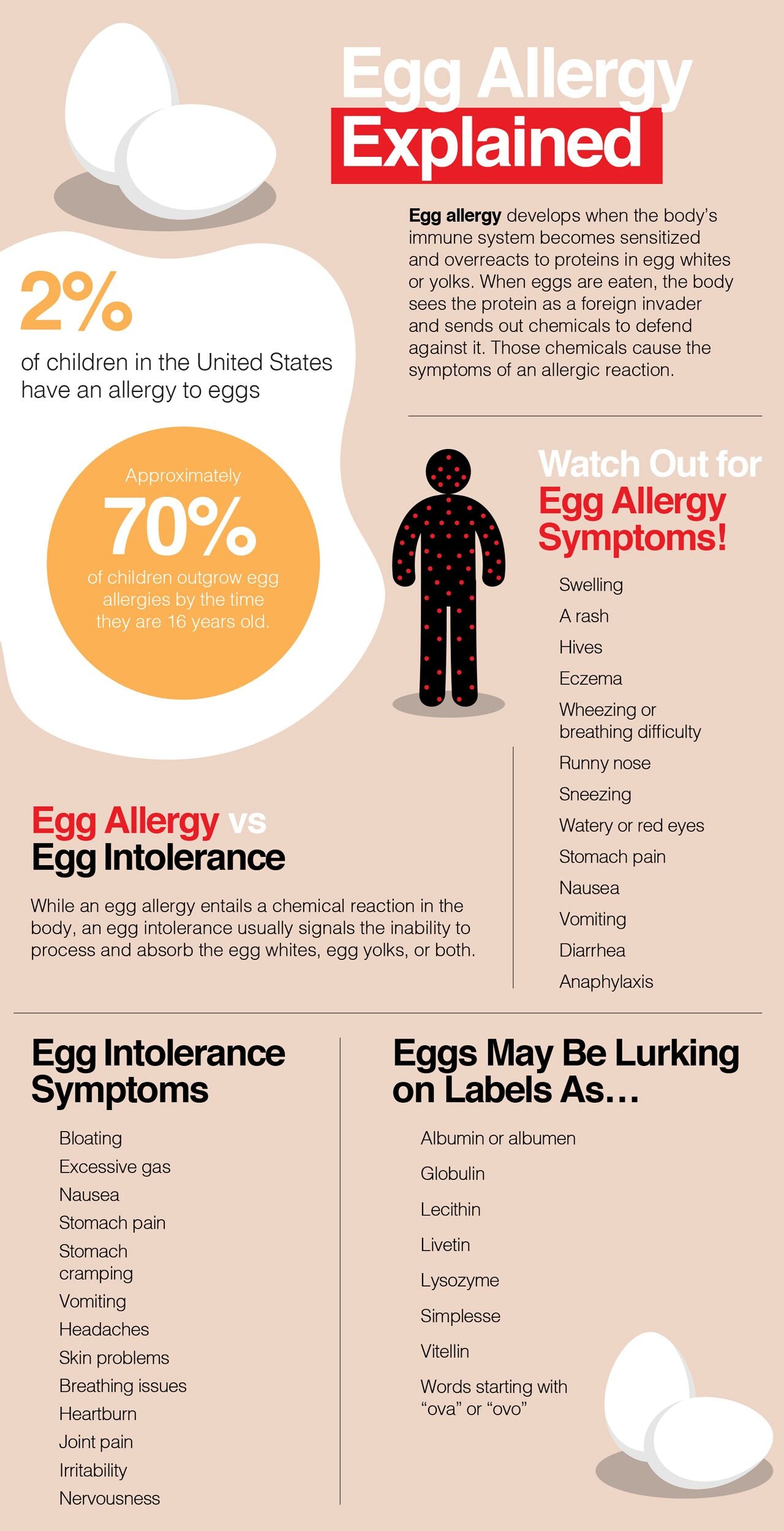Egg Allergy: Symptoms and Healthy Egg Alternatives
 By: by Amino Science
By: by Amino Science

The amino acid balance of egg protein is almost perfect to meet human requirements. Eggs furnish such an excellent and complete source of amino acids and protein that they provide the gold standard for all foods.
While eggs are at the core of many delicious and nutritious meals, they are also one of the most common food allergies. Someone with an egg allergy can be allergic to the white, yolk, or both, but most people affected are allergic to egg-white proteins. Naturally those who are egg-allergic avoid eggs, but eggs may be lurking in processed and packaged foods as well as common types of vaccines, so extra vigilance is necessary.
Egg allergies are among the easiest food allergies to treat. Many companies are now creating egg-free products for vegans and people who are allergic or intolerant to eggs. Various healthy alternatives to eggs can be used in culinary creations. If a person is unable to eat eggs, essential amino acid requirements can be met with a complete essential amino acid supplement.
Egg Allergy Info
According to the American College of Allergy, Asthma & Immunology, egg allergy is a result of the immune system in the body developing a sensitivity and an overreaction to egg white or yolk proteins. When someone with an egg allergy consumes eggs, the immune system perceives that the protein is an invasive substance and manufactures chemicals to keep it from doing harm. Allergic reactions are the result of the chemicals producing symptoms.
An egg allergy indicates previous exposure to eggs through either diet or vaccination that then caused the allergic reaction. When someone is allergic to eggs, the body’s immune system erroneously points the finger at egg protein as an invader not to be trusted. When that person comes into contact with eggs, the immune system sets off the release of histamine and other chemicals, triggering an allergic reaction of visible and internal symptoms in the body.
Egg allergies occur more commonly in young children than in adults. The ACAAI estimates that as many as 2% of American children are allergic to eggs. Skin conditions such as eczema make kids even more vulnerable. Egg allergies are prevalent in children who had infantile eczema, and the worst reactions happen when children are between 6 and 15 months old. Genetics heighten the likelihood of a food allergy, as children with parents who have food allergies or other allergies are more likely to have food allergies as well. Approximately 70% of children outgrow egg allergies by age 16.
Egg Allergy Symptoms
When a person has an egg allergy, the body’s immune system goes into overdrive to react to proteins in the egg. When something made with eggs approaches the digestive system, the body regards it as destructive. The immune system answers the call by developing specific antibodies to that food to repel the invader. These immunoglobulin E (IgE) antibodies cause the release of certain chemicals, including histamine, into the body.
Within a brief amount of time after eating or touching eggs, someone with an allergy can have reactions including:
- Swelling
- A rash
- Hives
- Eczema
- Wheezing or difficulty breathing
- Runny nose
- Sneezing
- Watery or red eyes
- Stomach pain
- Nausea
- Vomiting
- Diarrhea
- Anaphylaxis (a potentially fatal reaction that includes shortness of breath, swelling of the throat, and dizziness from a sudden drop in blood pressure)
Anaphylaxis is such a severe allergic reaction it can make a child pass out and may quickly lead to shock.
Allergy symptoms normally come on suddenly, are triggered by a small amount of food, occur every time someone eats the food, and can be life-threatening.
Egg allergy symptoms usually begin in childhood or young adulthood. Adults who eat eggs tend to have less intense reactions. The reactions may include a skin reaction or a bout of nausea.
Egg Intolerance
The major culprit in egg intolerance is albumen, which is the egg white. Most people who have problems with eggs can, nonetheless, tolerate the yolk. Unlike the chemical reaction of an allergy to eggs, an intolerance to eggs means that the body cannot handle and digest various components of the egg.
Egg Intolerance Symptoms
There are many symptoms of egg intolerance, but they are rare, gradual, and relatively harmless unless you eat a lot of eggs or eat them often. The most frequent symptoms are throwing up, feeling cramps or pain in the stomach, feeling bloated or flatulent, and being nauseous. Less frequent symptoms are heartburn, headaches, skin and breathing concerns, joint pain, irascibility, and tension.
Elusive Eggs
While people try to minimize their consumption of eggs on the table, they may not realize that many vaccines contain egg protein. As the Centers for Disease Control and Prevention(CDC) website explains, “Most flu shots and the nasal spray flu vaccine are manufactured using egg-based technology. Most flu vaccines today are produced using an egg-based manufacturing process and thus contain a small amount of egg protein called ovalbumin.”
The yellow fever vaccine, often needed when traveling to various countries, also entails egg protein. According to researchers at the National Institutes of Health (NIH), “The measles virus used in the MMR (measles, mumps, rubella) and single measles vaccine is grown in cultures of fibroblasts from chick embryos, and there have been concerns raised about the possible presence of egg protein in the vaccines and the advisability of administration to individuals who are allergic to eggs.”
Egg proteins go by other names when used as ingredients in food and other products. They might be listed on food labels as albumin or albumen, globulin, lecithin, livetin, lysozyme, simplesse, and vitellin, and other words starting with “ova” or “ovo,” the prefix for ovum, the Latin word for egg.
People allergic to chicken eggs may also have an allergy to turkey, quail, duck, and goose eggs.
Egg allergy foods to avoid include bread, cakes, ice cream, mayonnaise, pancakes, puddings, quiches, sauces, and spreads. Egg substitutes may also contain egg whites, causing problems for people with egg allergies. Other household items, such as shampoos, makeup, finger paints, and certain medications may contain egg products as well.

Diagnosis of Egg Allergy
Clinicians use the skin-prick test, which involves placing a sample of egg-protein-containing liquid on the forearm or back, and then pricking it with a tiny, sterile probe so that the liquid oozes into the skin. If a raised, reddish spot appears in the next 15 to 20 minutes, an allergy is present. By adjusting the protein in the liquid, a skin-prick assessment can verify that the allergy is caused by egg white proteins or egg yolk proteins.
Egg-specific Immunoglobulin E (IgE) can predict persistent egg allergy. Clinicians use the IgE test to find out if there are IgE antibodies to egg protein by sending a sample of a patient’s blood to an outside laboratory.
When such tests come out with inconclusive results, the doctor may decide to use actual food to see how the patient reacts. Supervised by medical personnel, the patient consumes the food in question—in this case, eggs—to determine whether there is a reaction. Due to the potential severe reaction, this oral food test must be conducted at a medical facility or center that has medication and equipment to treat any problems that might develop.
There is another kind of test that eliminates food from a person’s diet to see whether it might be the cause of an allergy. If you show no symptoms when you stop eating eggs but symptoms reemerge when small amounts of eggs are re-introduced, an egg allergy is indicated.
Managing An Egg Allergy
The following four tips can help you manage and treat your egg allergy.
1. The Obvious: Avoid Eggs!
The optimal way to manage an egg allergy is to stop eating eggs and products containing eggs. If a person has an egg allergy, he or she must be very careful about not buying products that contain traces of eggs and not eating eggs that are part of meals consumed outside the home. The Food Allergen Labeling and Consumer Protection Act of 2004 mandates that foods containing eggs must have specific labels. When packaged foods are sold in the United States, the manufacturers have to clearly label them as containing eggs or egg products.
2. Control the Symptoms
Antihistamines can help subdue the milder allergy symptoms such as rash and itching. Physicians also prescribe epinephrine (adrenaline) in an auto-injector that can be used in case of anaphylaxis. The auto-injector should be kept on your person 24-7 and used immediately upon the appearance of symptoms. Anaphylaxis is a life-threatening condition that requires immediate medical attention and emergency treatment. Even if epinephrine relieves the symptoms, it is possible they will recur.
3. Cook Egg-Free Cuisine
It is easy to modify recipes so that eggs do not need to be used. A tablespoon of oil, a tablespoon of water, and a teaspoon of baking powder can be substituted for every egg in a recipe that calls for three or fewer eggs. You could also take one package of unflavored gelatin and dissolve and mix it in 2 tablespoons of tepid water to substitute for eggs in a recipe. A third suggestion is to dissolve 1 teaspoon of yeast in a cup of tepid water.
4. Take an Amino Acid Supplement
Amino acid supplements can be used to substitute for the rich assortment of 18 amino acids found in eggs. One single large egg includes 6.28 grams of protein and contains all nine essential amino acids: histidine, isoleucine, leucine, lycine, methionine, phenylalanine, threonine, tryptophan, and valine.
Eggs also contain glutamic acid, aspartic acid, and alanine, three of the four nonessential amino acids, as well as the semi-essential amino acids arginine, cysteine, glycine, proline, serine, and tyrosine. The yolk and white each contain the same 18 amino acids.
We recommend Amino Co supplements, pure, patented, and formulated by the world's leading amino acid researchers. Shop the product line here.

Up to 25% off Amino
Shop NowTAGS: food
Join the Community
Comments (0)
Most Craveable Recipes




 833-264-6620
833-264-6620



















